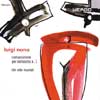Nono Composizione per Orchestra No 1
A little short on intensity, but this is music which gives the lie to the charge of ‘empty’
View record and artist detailsRecord and Artist Details
Composer or Director: Luigi Nono
Genre:
Orchestral
Label: Wergo
Magazine Review Date: 10/2004
Media Format: CD or Download
Media Runtime: 51
Mastering:
Stereo
DDD
Catalogue Number: WER6667-2

Tracks:
| Composition | Artist Credit |
|---|---|
| Composizione per Orchestra No 1 |
Luigi Nono, Composer
Berlin Symphony Orchestra Luigi Nono, Composer Peter Hirsch, Conductor |
| Der Rote Mantel |
Luigi Nono, Composer
Angelika Luz, Soprano Berlin RIAS Chamber Choir Berlin Symphony Orchestra Jörg Gottschick, Bass Luigi Nono, Composer Peter Hirsch, Conductor |
Author: Arnold Whittall
Two little-known works from the first half of the 1950s provide important evidence of Luigi Nono’s early attempts to move beyond the relatively backward-looking lyric style of Dallapiccola. Nono’s concern was to do this without abandoning the eloquence which was necessary if Utopian social and political ideals were not to be lost sight of – as was the risk, of course, with the more austere radicalism of Boulez and others at that time.
Behind the neutral title of Composizione per Orchestra No 1 the struggle for a viable musical language is acted out, the music moving from gentle eloquence to aggressive jubilation. The triumphant drumming at the end has an air of almost simplistic assurance, prefiguring the agitprop quality that Nono didn’t attempt to exclude in the years ahead, and this directness of expression, allied to an economy of means that never sinks into aloof austerity, is fully deployed in Il mantello rosso (‘The red cloak’), a ballet score from 1954 based on a play by Federico García Lorca which has attracted several opera composers, including Bruno Maderna and Simon Holt.
Nono’s music has its forceful, more obviously dance-like moments, but overall the effect is one of dream-like understatement, at least in a performance which is rhythmically spry but possibly too cool (and too dryly recorded) to bring out the music’s full intensity of expression. Voices are used in characteristically haunting fashion, and the whole work is a salutary reminder of what is lost by casual dismissal of the music of younger European composers in the first post-war decade as either experimental or empty.
Behind the neutral title of Composizione per Orchestra No 1 the struggle for a viable musical language is acted out, the music moving from gentle eloquence to aggressive jubilation. The triumphant drumming at the end has an air of almost simplistic assurance, prefiguring the agitprop quality that Nono didn’t attempt to exclude in the years ahead, and this directness of expression, allied to an economy of means that never sinks into aloof austerity, is fully deployed in Il mantello rosso (‘The red cloak’), a ballet score from 1954 based on a play by Federico García Lorca which has attracted several opera composers, including Bruno Maderna and Simon Holt.
Nono’s music has its forceful, more obviously dance-like moments, but overall the effect is one of dream-like understatement, at least in a performance which is rhythmically spry but possibly too cool (and too dryly recorded) to bring out the music’s full intensity of expression. Voices are used in characteristically haunting fashion, and the whole work is a salutary reminder of what is lost by casual dismissal of the music of younger European composers in the first post-war decade as either experimental or empty.
Discover the world's largest classical music catalogue with Presto Music.

Gramophone Digital Club
- Digital Edition
- Digital Archive
- Reviews Database
- Full website access
From £8.75 / month
Subscribe
Gramophone Full Club
- Print Edition
- Digital Edition
- Digital Archive
- Reviews Database
- Full website access
From £11.00 / month
Subscribe
If you are a library, university or other organisation that would be interested in an institutional subscription to Gramophone please click here for further information.




